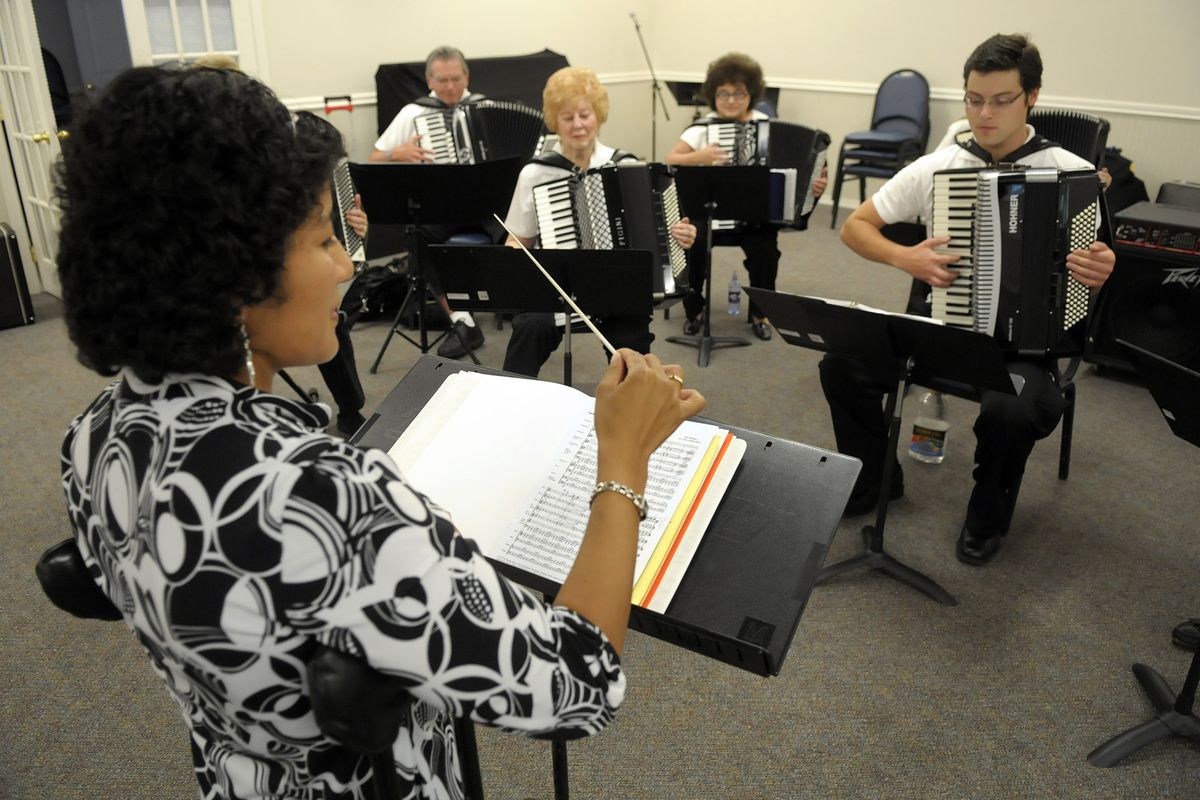Instructor, conductor puts spotlight on accordion’s versatility
Instructor, conductor puts spotlight on accordion’s versatility

When the Spokane Accordion Ensemble performs Friday night as guest artists at the Old Time Accordion Championships in Kimberly, B.C., it will be a happy and nostalgic event for Patricia Bartell, the ensemble’s conductor.
Some years back when Myron Floren, the famous accordionist from The Lawrence Welk Show, was the featured artist at the same festival, he brought up several accordionists from the Northwest to perform with him – Bartell being one of them. So warm is that memory that the ensemble will open its performance with a medley of hoedown pieces from music Floren once gave to the young artist.
When people think of the accordion, they think of Lawrence Welk and polkas, Bartell acknowledges. “But accordion is not just a polka box,” she said – it’s a versatile instrument with an immense repertoire and following. Blues, jazz, folk, ethnic, Cajun, classical, contemporary and more – accordionists play it all. And internationally, polkas aren’t even much on the radar.
Accordion is huge around the globe, especially in Europe. Bartell said it’s now the leading instrument in China, where there are 10,000 accordion orchestras and the instrument is taught in many schools, not just for musicianship but also for brain development purposes.
There are four major international festivals that draw hundreds of contestants and big prizes. The CMA (Confederation Mondiale de L’Acordeon) in Vigo, Spain, is considered the world cup trophy for accordion and has a top prize of more than $25,000.
Bartell serves as the U.S. adjudicator for CMA events, where musicians perform the most complex and difficult French, Italian and Russian musical pieces. When she performed at one of the top festivals in 2009 in Italy, she was the first American woman there in decades to attempt the difficult musical literature (she placed third among the world competitors). “Unfortunately, there were some pretty low expectations of Americans, who traditionally have not been open to learning the classical literature,” she said, “but that is changing.”
Some of that change may be due to Bartell herself.
“Patricia goes out and gets more and more knowledge and grows in ways you don’t always see in the music world,” said Kendall Feeney, a Spokane pianist and performer who works with Bartell on timing, nuance and balance in her musicianship.
Another change in perception occurred when Bartell brought Frederic Deschamps, CMA president (and another one of her teachers), from France to Spokane for a performance and master class last year. He was so impressed with what he saw here that he committed the 2012 world cup event to Spokane. “We now have a lot of work to do to line up sponsors, venues and prepare for this,” Bartell said.
Bartell, who teaches accordion in Spokane, conducts the ensemble and serves as an adjunct instructor of the instrument at North Idaho College, is quite comfortable in the larger world of accordion performance. “Here I am, a Bolivian who is American, who teaches Russian musical literature with French technique,” she said. “I guess I am pretty international.”
She was born 33 years ago in Bolivia. She developed polio as a young child and when left at an orphanage there, also had severe tonsillitis. “I wasn’t expected to live,” she said. But she did, and at age 5 was adopted by an American family from Montana, where she was raised as one of 18 children, 12 of whom, like her, were adopted. She began playing accordion at age 8, begging her parents to let her switch to that instrument from piano because a brother played accordion.
When she wanted to pursue accordion studies in college, she chose Whitworth University, where she earned a degree in music education and performance. “Whitworth was the only university I found at the time that accepted accordion as a solo instrument,” she said. It was there that she studied under Ilmar Kuljus, founder of the Spokane Accordion Ensemble, a group she began performing with 14 years ago, taking over the baton after four years when Kuljus retired. (Her website is www.abletoplay.net.)
Bartell explains that the sound of the accordion is unexpected for many. The three reed blocks in the instrument allow pitches similar to bassoons, clarinets and piccolos. When it performs, the 12-member ensemble sounds like a multi-instrumented group. “A lot of people have no idea what the accordion is capable of in performance,” said ensemble member Kathleen Falco.
So just who plays accordion these days? Surprisingly, everyone, including many children.
Members of the ensemble range in age from 22 to 86 and include a farmer, nurse practitioner, retired police officer, biotech engineering professor and music teachers. Some come from pretty far away for the weekly rehearsals – like Falco, who makes the 90-minute drive in from her horse ranch in Careywood, Idaho, to take lessons from Bartell and to play with the group. She played as a child and picked up the instrument again as an adult, “which is pretty typical for a lot of us. You might be surprised at how many people have an old accordion in a closet somewhere.”
It’s not an easy instrument to master, Falco said, pointing out that there are 120 bases and chords on one side that have to be played from memory, the bellows to work and a sideways keyboard to play on the other side. “But what a challenge for my brain,” Falco added. “I only wish I had more time to devote to it.” Bartell said the instrument really is very manageable. “After all, the fingers go so much faster than the brain.”
The nonprofit Spokane Accordion Ensemble performs two large concerts in Spokane each year – in December and May – and plays at retirement centers, schools and other events in the region.
And sometimes they will even play a polka or two.